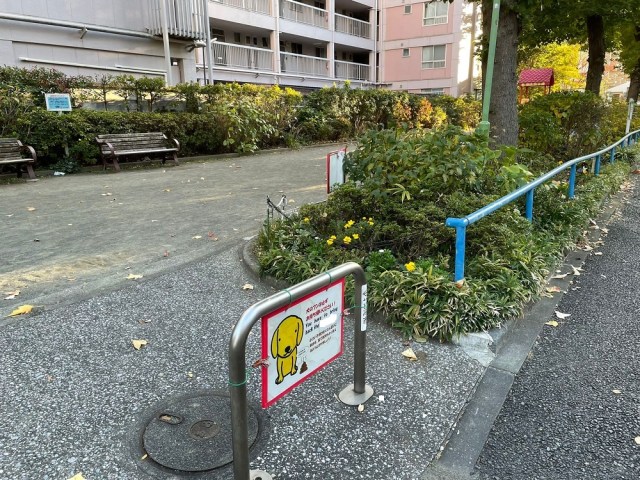
Kanji quirk leads to some harsh language in reminder to pet owners.
Like a lot of people, since the start of the pandemic I’ve spent a lot more time going for walks around my neighborhood than I ever did before. When you’re feeling cooped up in the house but still trying to avoid crowds, Japan’s often congested trains and subways aren’t such an attractive transportation option.
On the bright side, my neighborhood in Yokohama is a pretty nice one, with a couple of tree-lined streets and multiple parks. They’re not anything fancy, but most have benches and shade, making them inviting spots to sit down and eat a takeout meal or sip a hot bottle of green tea.
But apparently they’ve been having a bit of a problem at the park in these photos. The nice, leafy street is also a popular place for local pet owners to take their dogs for walks, and some of them are stopping by the park when their dogs need to drop a deuce, then leaving the mess behind. Because of that, the park has put up a sign at the entrance politely asking owners to take care of their pooch’s poo.
Well, more accurately, the sign’s Japanese text asks relatively politely, saying “Inu no fun wa kanarazu omochikaeri kudasai!”, or “Please make absolutely sure to take your dog’s droppings home with you,” with fun being an inoffensive Japanese word similar to the English “droppings” or “feces.”
The sign’s English version of the message, though? Its vocabulary is a little more colorful.
“You have to bring back the dog’s shit,” the sign informs English readers. The harsher vocabulary is somewhat offset by the lack of the Japanese version’s exclamation point, though, but that almost makes the matter-of-fact dropping of the expletive even more startling.
So how’d the sign end up like this? Going back to the word used in Japanese, fun, on the sign it’s rendered as フン, in the phonetic script called katakana. That’s kind of unusual, since katakana is most commonly used for foreign loanwords, but it also sometimes gets used for Japanese words with kanji characters that aren’t commonly used (as with certain scientific or medical terms). But because Japanese has so many words that are pronounced the same way but have different meanings, if you plug the phonetic katakana フン into a translation program it won’t quite know what to do with it, and might try to force-fit it as a foreign word or name.
▼ Here’s Google translating フン as the Chinese surname Hung, for example.
Odds are whatever ward office employee was in charge of writing the sign ran into this roadblock trying to translate fun written as フン. However, fun does actually have a kanji, even if it’s not commonly used, so presumably that was the sign writer’s next choice to plug into the Japanese-to-English translation tool. Unfortunately, the kanji for fun is this…
…which is also the kanji for kuso, a harsher word that’s the Japanese language’s version of “shit,” and apparently “shit” is what the sign writer got back.
▼ Google’s translation result for 糞
Since fun and kuso technically mean the same thing, it’s not so shocking that they share a kanji. Their very different atmospheres, though, are a big part of the reason why they’re usually written phonetically, in either katakana or hiragana, since the kanji doesn’t give the writer the ability to differentiate between the politer “droppings” and harsher “shit.”
▼ Oh, and if you were curious about the steaming coil of poo’s line of dialogue, it’s saying “Please don’t leave me behind here!”
In defense of whoever wrote, literally, this shit, it’s not like my neighborhood has a huge ex-pat population, so really any sort of English signage is a thoughtful gesture by the local parks department. And honestly, seeing some startling vocabulary is still a lot better than stepping in a brown squishy surprise.
Photos ©SoraNews24
● Want to hear about SoraNews24’s latest articles as soon as they’re published? Follow us on Facebook and Twitter!
Follow Casey on Twitter for more Japanese linguistics (and probably not much more poo).

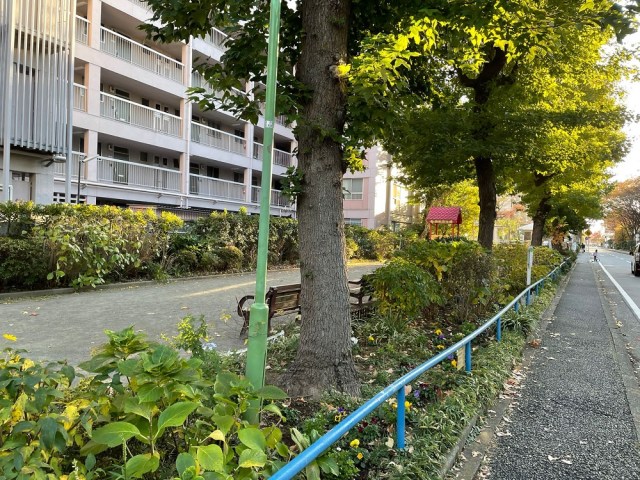
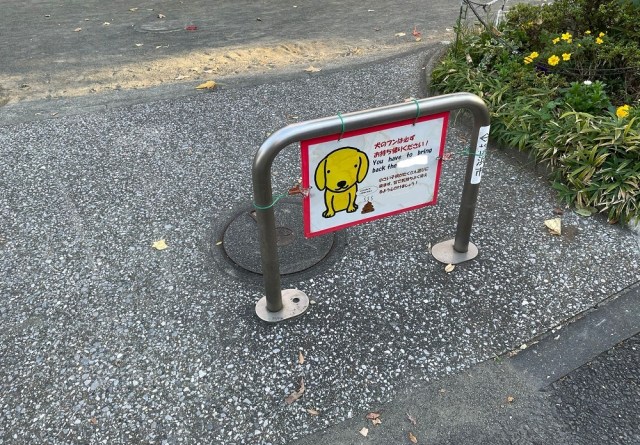
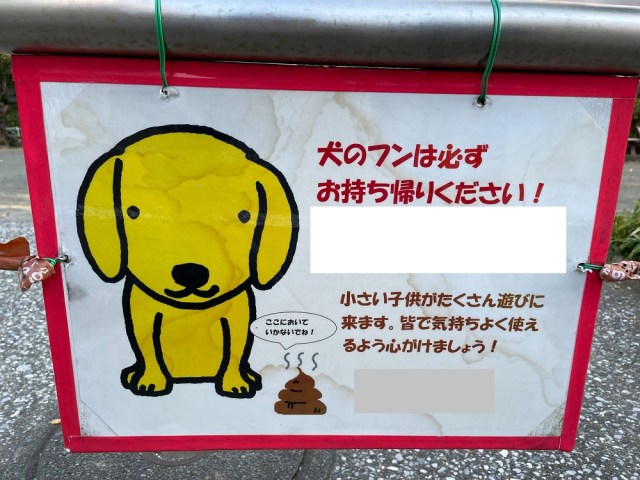
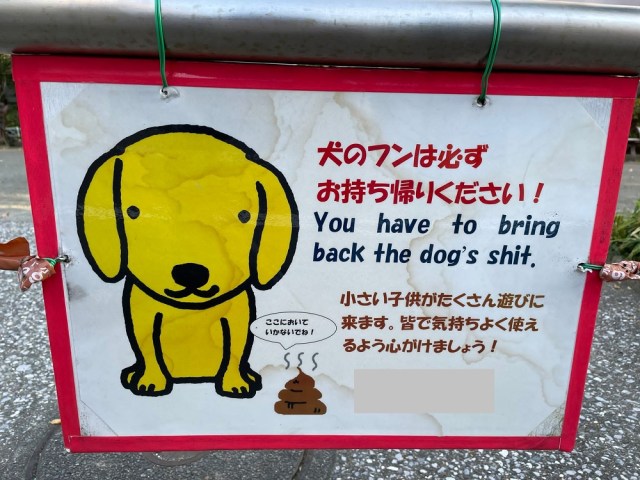
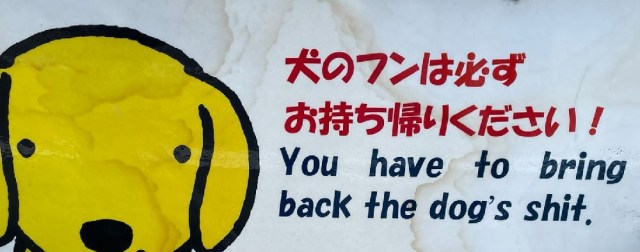

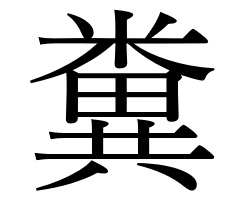

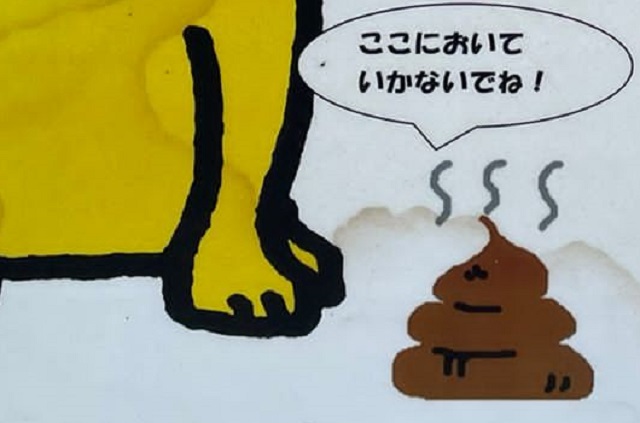
 Dodge the biggest problem of giving yourself a kanji name with these for-foreigner personal seals
Dodge the biggest problem of giving yourself a kanji name with these for-foreigner personal seals Yahoo! Japan finds most alphabetic and katakana words Japanese people want to find out about
Yahoo! Japan finds most alphabetic and katakana words Japanese people want to find out about Kyoto accidentally calls all old people “terrible drivers”【Why Does Engrish Happen in Japan?】
Kyoto accidentally calls all old people “terrible drivers”【Why Does Engrish Happen in Japan?】 New light-up Japanese bar sign capsule toys make drinking at home feel like a night on the town
New light-up Japanese bar sign capsule toys make drinking at home feel like a night on the town Mark your territory with these mega cute Japanese name stamps, starring 15 playful dog breeds
Mark your territory with these mega cute Japanese name stamps, starring 15 playful dog breeds McDonald’s new Happy Meals offer up cute and practical Sanrio lifestyle goods
McDonald’s new Happy Meals offer up cute and practical Sanrio lifestyle goods All-you-can-drink Starbucks and amazing views part of Tokyo’s new 170 meter-high sky lounge
All-you-can-drink Starbucks and amazing views part of Tokyo’s new 170 meter-high sky lounge Beautiful Sailor Moon manhole cover coasters being given out for free by Tokyo tourist center
Beautiful Sailor Moon manhole cover coasters being given out for free by Tokyo tourist center More foreign tourists than ever before in history visited Japan last month
More foreign tourists than ever before in history visited Japan last month The oldest tunnel in Japan is believed to be haunted, and strange things happen when we go there
The oldest tunnel in Japan is believed to be haunted, and strange things happen when we go there Studio Ghibli glasses cases let anime characters keep an eye on your spectacles
Studio Ghibli glasses cases let anime characters keep an eye on your spectacles Arrest proves a common Japanese saying about apologies and police
Arrest proves a common Japanese saying about apologies and police Starbucks reopens at Shibuya Scramble Crossing with new look and design concept
Starbucks reopens at Shibuya Scramble Crossing with new look and design concept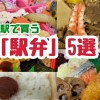 The 5 best Japanese bento to buy at Kyoto Station
The 5 best Japanese bento to buy at Kyoto Station Disney princesses get official manga makeovers for Manga Princess Cafe opening in Tokyo
Disney princesses get official manga makeovers for Manga Princess Cafe opening in Tokyo We try out “Chan Ramen”, an underground type of ramen popular in the ramen community
We try out “Chan Ramen”, an underground type of ramen popular in the ramen community Beautiful new Final Fantasy T-shirt collection on the way from Uniqlo【Photos】
Beautiful new Final Fantasy T-shirt collection on the way from Uniqlo【Photos】 Foreign English teachers in Japan pick their favorite Japanese-language phrases【Survey】
Foreign English teachers in Japan pick their favorite Japanese-language phrases【Survey】 Is the new Shinkansen Train Desk ticket worth it?
Is the new Shinkansen Train Desk ticket worth it? There’s a park inside Japan where you can also see Japan inside the park
There’s a park inside Japan where you can also see Japan inside the park Japanese convenience store packs a whole bento into an onigiri rice ball
Japanese convenience store packs a whole bento into an onigiri rice ball Studio Ghibli releases Kiki’s Delivery Service chocolate cake pouches in Japan
Studio Ghibli releases Kiki’s Delivery Service chocolate cake pouches in Japan Japan’s bone-breaking and record-breaking roller coaster is permanently shutting down
Japan’s bone-breaking and record-breaking roller coaster is permanently shutting down New definition of “Japanese whiskey” goes into effect to prevent fakes from fooling overseas buyers
New definition of “Japanese whiskey” goes into effect to prevent fakes from fooling overseas buyers Foreign passenger shoves conductor on one of the last full runs for Japan’s Thunderbird train
Foreign passenger shoves conductor on one of the last full runs for Japan’s Thunderbird train Our Japanese reporter visits Costco in the U.S., finds super American and very Japanese things
Our Japanese reporter visits Costco in the U.S., finds super American and very Japanese things Kyoto bans tourists from geisha alleys in Gion, with fines for those who don’t follow rules
Kyoto bans tourists from geisha alleys in Gion, with fines for those who don’t follow rules Studio Ghibli unveils Mother’s Day gift set that captures the love in My Neighbour Totoro
Studio Ghibli unveils Mother’s Day gift set that captures the love in My Neighbour Totoro Domino’s Japan now sells…pizza ears?
Domino’s Japan now sells…pizza ears? New Japanese KitKat flavour stars Sanrio characters, including Hello Kitty
New Japanese KitKat flavour stars Sanrio characters, including Hello Kitty Sales of Japan’s most convenient train ticket/shopping payment cards suspended indefinitely
Sales of Japan’s most convenient train ticket/shopping payment cards suspended indefinitely Sold-out Studio Ghibli desktop humidifiers are back so Totoro can help you through the dry season
Sold-out Studio Ghibli desktop humidifiers are back so Totoro can help you through the dry season Japanese government to make first change to romanization spelling rules since the 1950s
Japanese government to make first change to romanization spelling rules since the 1950s Ghibli founders Toshio Suzuki and Hayao Miyazaki contribute to Japanese whisky Totoro label design
Ghibli founders Toshio Suzuki and Hayao Miyazaki contribute to Japanese whisky Totoro label design Doraemon found buried at sea as scene from 1993 anime becomes real life【Photos】
Doraemon found buried at sea as scene from 1993 anime becomes real life【Photos】 Tokyo’s most famous Starbucks is closed
Tokyo’s most famous Starbucks is closed One Piece characters’ nationalities revealed, but fans have mixed opinions
One Piece characters’ nationalities revealed, but fans have mixed opinions We asked a Uniqlo employee what four things we should buy and their suggestions didn’t disappoint
We asked a Uniqlo employee what four things we should buy and their suggestions didn’t disappoint Princesses, fruits, and blacksmiths: Study reveals the 30 most unusual family names in Japan
Princesses, fruits, and blacksmiths: Study reveals the 30 most unusual family names in Japan Studio Ghibli’s new desktop Howl’s Moving Castle will take your stationery on an adventure
Studio Ghibli’s new desktop Howl’s Moving Castle will take your stationery on an adventure Japanese mom praises hard-studying teenage son…for his Pokémon notes?!?
Japanese mom praises hard-studying teenage son…for his Pokémon notes?!? Twitter users say Japanese Prime Minister’s name is hiding in the kanji for Japan’s new era name
Twitter users say Japanese Prime Minister’s name is hiding in the kanji for Japan’s new era name Pokémon Center apologizes for writing model Nicole Fujita’s name as Nicole Fujita
Pokémon Center apologizes for writing model Nicole Fujita’s name as Nicole Fujita Square Enix announces new Romancing Saga project! Don’t fire up your PS4 just yet though
Square Enix announces new Romancing Saga project! Don’t fire up your PS4 just yet though Struggling with Japanese? Let Tako lend you a hand…or five
Struggling with Japanese? Let Tako lend you a hand…or five Sushi store makes waves in Japan for meal with a surprising 14-character katakana name
Sushi store makes waves in Japan for meal with a surprising 14-character katakana name 11 different ways to say “father” in Japanese
11 different ways to say “father” in Japanese Poop Kanji-Drill toilet paper is the best way to accomplish your Japanese studying doo-ties
Poop Kanji-Drill toilet paper is the best way to accomplish your Japanese studying doo-ties English conversation school in Japan has clever reminder that students don’t have to be perfect
English conversation school in Japan has clever reminder that students don’t have to be perfect Japan’s Kanji of the Year revealed, reflects both the good and the bad of 2022
Japan’s Kanji of the Year revealed, reflects both the good and the bad of 2022 F**k it! Japan’s most respected newspaper prints a double-dose of uncensored F-bombs
F**k it! Japan’s most respected newspaper prints a double-dose of uncensored F-bombs Okinawa pub posts “Japanese only” admission sign based on some shaky logic
Okinawa pub posts “Japanese only” admission sign based on some shaky logic “Good on the floor?” Five funny times Google Translate drops the ball with Japanese idioms
“Good on the floor?” Five funny times Google Translate drops the ball with Japanese idioms Transform your fridge into a Japanese nightscape with light-up snack bar signboard magnets
Transform your fridge into a Japanese nightscape with light-up snack bar signboard magnets Japan’s Twitterers ponder this “don’t feed the pigeons” sign found at train station
Japan’s Twitterers ponder this “don’t feed the pigeons” sign found at train station
Leave a Reply